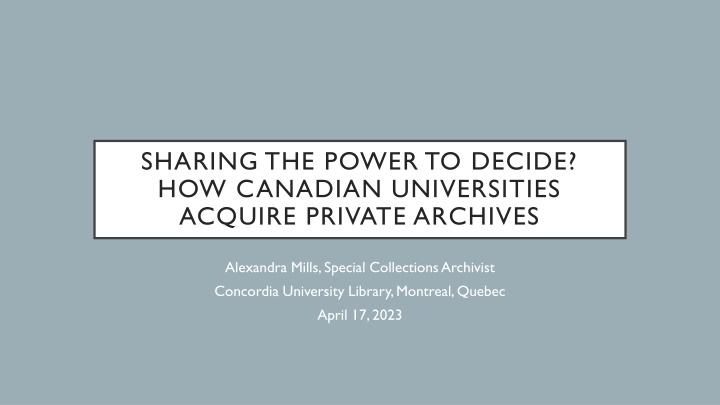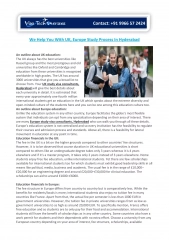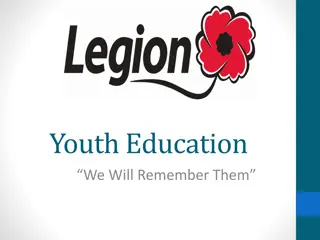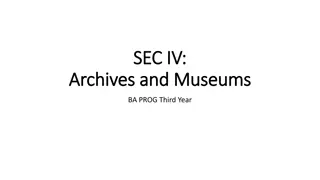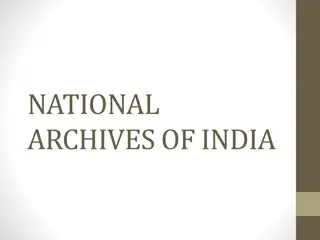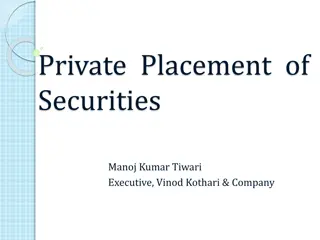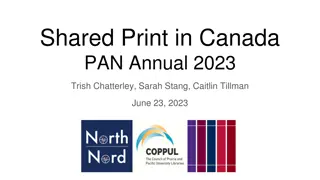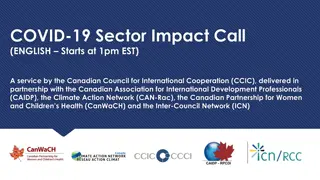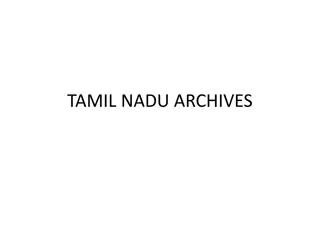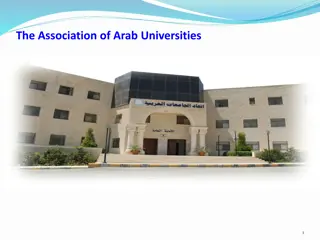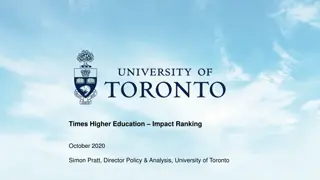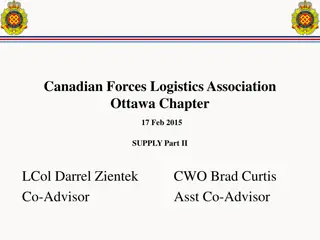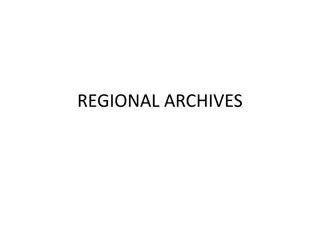Acquiring Private Archives in Canadian Universities: Insights and Practices
The research delves into the acquisition of private archival materials by academic libraries in public universities across Canada. It explores decision-making processes, collaboration practices, and the involvement of internal and external contributors in building collections. The study sheds light on repository demographics, response rates, and the significance of private archives in university settings.
Download Presentation

Please find below an Image/Link to download the presentation.
The content on the website is provided AS IS for your information and personal use only. It may not be sold, licensed, or shared on other websites without obtaining consent from the author.If you encounter any issues during the download, it is possible that the publisher has removed the file from their server.
You are allowed to download the files provided on this website for personal or commercial use, subject to the condition that they are used lawfully. All files are the property of their respective owners.
The content on the website is provided AS IS for your information and personal use only. It may not be sold, licensed, or shared on other websites without obtaining consent from the author.
E N D
Presentation Transcript
SHARING THE POWER TO DECIDE? HOW CANADIAN UNIVERSITIES ACQUIRE PRIVATE ARCHIVES Alexandra Mills, Special Collections Archivist Concordia University Library, Montreal, Quebec April 17, 2023
SURVEY TITLE AND DURATION Survey title: Archival acquisition in Canada: Decision making practices at University-based repositories that collect private archives Duration: the survey was open for a 4-week period: Initial period: February 27-March18, 2024 Extension: March 19-March 25, 2024
PURPOSE The purpose of the research is to better understand institutional practices around the acquisition of private archival materials by academic libraries and archives located within public universities in Canada. This survey intends to determine how acquisition decisions are made; whether acquisition practices are collaborative; whether institutions work with community-based individuals and/or organizations to build collections; what role internal and/or external contributors play in the decision- making process; and why repositories choose to involve these contributors in the acquisition process.
DISTRIBUTION AND RESPONSE RATE Sent to 113 repositories based in public universities in each province and territory across Canada. Archivists and librarians at 36 repositories completed the survey. Response rate: 32%
PRIVATE ARCHIVES Both archival fonds and archival collections created by individuals, families, or organizations external to, but not necessarily unaffiliated, with the university. While individual acquisitions may contain books, they must contain archival materials.
DEMOGRAPHICS GEOGRAPHY Location of repository 12 10 8 6 4 2 0
DEMOGRAPHICS LANGUAGE OF INSTITUTION 90 Respondents by language (%) 80 70 60 50 40 30 20 10 0 English-language institution French-language institution Bilingual-institution English-language institution Bilingual-institution French-language institution Participants invited Respondents
DEMOGRAPHICS REPOSITORY TYPE Other Administratively and physically separate from the library Administratively based in the library but physically separate Physically based in the library but administratively separate Administratively and physically based in the library 0 5 10 15 20 25
DEMOGRAPHICS CARL MEMBERS Canadian Association of Research Libraries (CARL) CARL members Not members of CARL Unknown
DEMOGRAPHICS STAFFING LEVELS Professional librarians and/or archivists Professional librarians and/or archivists (%) 20 15 10 5 0 1 2-6 7-11 12-16 More than 16 Professional librarians and/or archivists 1 2-6 7-11 12-16 More than 16
RESPONSIBILITY FOR DECISION MAKING Responsibility Responsibility (%) 14 12 10 8 6 4 2 Single archivist or librarian Group of archivists or librarians Varies depending on the proposal 0 Single archivist or librarian Group of archivists or librarians Varies depending on the proposal
ADMINISTRATOR INVOLVEMENT Administrator involvement in acquisitions 10 8 6 4 2 0 Single archivist or librarian Group of archivists or librarians Yes No
GROUP RESPONSIBILITY FOR DECISION MAKING TEAM SIZE Group size Reminder: Professional librarians and/or archivists 6 20 5 18 4 16 3 14 12 2 10 1 8 6 0 4 2-3 archivists and/or librarians 4-5 archivists and/or librarians 6-7 archivists and/or librarians More than 7 archivists and/or librarians 2 0 1 2-6 7-11 12-16 More than 16 Group size
WIDER INVOLVEMENT IN THE ACQUISITION PROCESS Community involvement (are other individuals involved in the acquisition process?) Community involvement (%) 25 20 15 10 5 0 Yes No Yes No
INVOLVEMENT OF OTHER ARCHIVE & LIBRARY STAFF Number of staff involved Library and archives contributors 16 14 12 14 10 12 8 10 6 8 4 6 2 4 0 2 0 1 to 2 3 to 4 5 to 6 7 or more
INTERNAL COMMUNITY Internal contributors are members of the university community, including but not limited to faculty, university administrators, advancement, department(s), legal services, etc. based within the university but outside the repository.
INVOLVEMENT OF THE INTERNAL COMMUNITY Number of internal community members involved Status of contribution 12 18 10 16 14 8 12 6 10 8 4 6 4 2 2 0 0 Formal Informal Both formal and informal 1 to 2 3 to 4 5 to 6 7 or more
INVOLVEMENT OF THE INTERNAL COMMUNITY Internal contributors Other Financial services Legal services Advancement University administration Departments Individual university staff Individual faculty members 0 2 4 6 8 10 12 14 16 18
INVOLVEMENT OF THE INTERNAL COMMUNITY Contributions of the internal community Other Collaborate on the development of new areas of specialization/collecting Contribute to the development of acquisition policies and procedures Review deaccession proposals Contribute to outreach activities involving potential donors Review acquisition proposals and are responsible for making acquisition decisions Review acquisition proposals and contributes to acquisition decisions by providing recommendations (recommend acceptance or rejection of proposals) Bring forward proposed acquisitions for consideration Suggest potential acquisitions for the repository to pursue 0 2 4 6 8 10 12 14 16 18
EXTERNAL COMMUNITY External contributors are members of the external community, such as individuals and organizations based outside the university, and may include donors, users, and community groups, among others.
INVOLVEMENT OF THE EXTERNAL COMMUNITY Number of external community members involved Status of contribution (%) 6 5 4 3 2 1 0 Formal Informal Both formal and informal 1 to 2 3 to 4 5 to 6 7 or more
INVOLVEMENT OF THE EXTERNAL COMMUNITY External contributors Other Governmental bodies (municipal, provincial, federal) Other archival repositories and/or archivists/librarians at other institutions Community groups or their representatives (not-for-profits) For profit organizations Sellers Donors Researchers, users 0 2 4 6 8 10 12 14
INVOLVEMENT OF THE EXTERNAL COMMUNITY Contributions of the external community Other Collaborate on the development of new areas of specialization/collecting Contribute to the development of acquisition policies and procedures Review deaccession proposals Contribute to outreach activities involving potential donors Review acquisition proposals and are responsible for making acquisition decisions Review acquisition proposals and contributes to acquisition decisions by providing recommendations (recommend acceptance or rejection of proposals) Bring forward proposed acquisitions for consideration Suggest potential acquisitions for the repository to pursue 0 2 4 6 8 10 12 14
CONSULTATIVE COMMITTEE Consultative or advisory committee Consultative or advisory committee (%) 30 25 20 15 10 5 0 Yes No Unsure Yes No Unsure
PERCEPTION: DO REPOSITORIES CONSIDER THEMSELVES TO BE PARTICIPATORY? Does your organization consider their acquisition strategy and/or practices to be participatory? Perception (%) 5 4 3 2 1 0 Yes No Unsure Yes No Unsure
THANK YOU! Questions? Want to learn more? Email: alexandra.mills@concordia.ca
